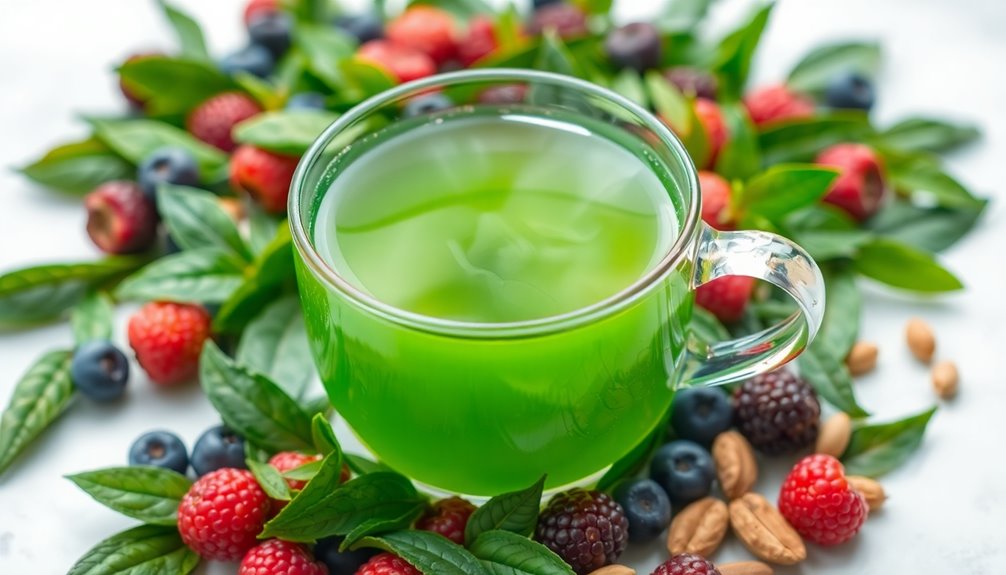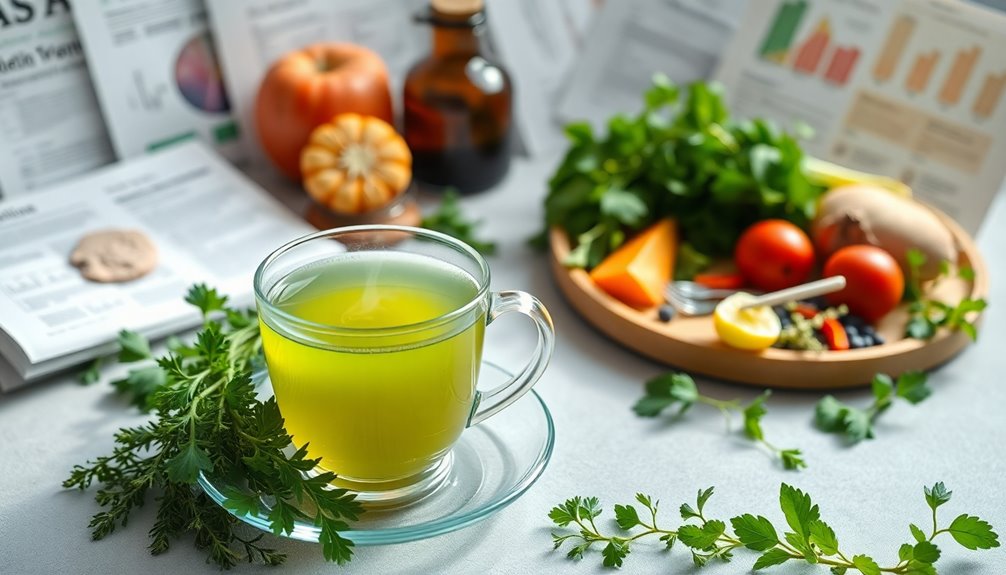Yes, tea can help lower high cholesterol, especially the bad type called LDL! Studies show that drinking black tea can reduce LDL cholesterol by about 6 to 11%. Green tea is even more powerful, cutting LDL by up to 16.4%! This happens thanks to special antioxidants called catechins and flavonoids, which help improve your heart health. But remember, results can vary from person to person. To get the most benefits, try sipping on 3-5 cups of tea daily while skipping sugar and cream. There's so much more wonderful information about how tea can support your heart health waiting for you!
Key Takeaways
- Black tea can lower LDL cholesterol levels by 6-10%, contributing to improved heart health.
- Regular consumption of green tea may reduce LDL cholesterol by up to 16.4% due to its catechin content.
- Antioxidants in tea help prevent cholesterol absorption and combat oxidative stress, enhancing cardiovascular health.
- Studies show mixed results; while many indicate significant LDL reductions, some find no effect on cholesterol levels.
- For optimal benefits, consume 3-5 cups of tea daily without added sugar or cream.
Introduction

When it comes to managing high cholesterol, many people wonder if simple dietary changes can make a difference. One delightful option you might consider is tea, especially black tea. Studies show that enjoying black tea can help lower your LDL cholesterol levels by about 6 to 10 percent. That means each time you sip your favorite cup, you're taking a small step towards better heart health!
Imagine sitting down with a warm cup of black tea, knowing that it could help reduce your risk of coronary heart disease. Isn't that exciting? The secret behind this magic lies in the phytonutrients and flavonoids found in tea. These special compounds work wonders for your cardiovascular health, making your heart stronger and happier.
While black tea is great for lowering LDL cholesterol, it doesn't really change HDL cholesterol much. Still, when you combine tea with smart dietary choices, you can enhance its benefits even more!
Tea's Impact on Cholesterol Levels

Tea can play a significant role in managing cholesterol levels, especially when you make it a regular part of your diet. Drinking black tea can help lower LDL cholesterol by 6 to 11 percent! That's a great start if you want to keep your heart healthy.
Plus, it can reduce total cholesterol by about 3.8% to 6.5% compared to drinks that don't have tea.
Green tea is also fantastic, thanks to its high catechin content. Some studies show that catechin extracts can lower LDL cholesterol by up to 16.4%. When you sip on these teas, you might be lowering your heart disease risk, making tea drinking a tasty way to support your health.
A systematic review of different studies shows that regular tea consumption can lead to significant reductions in LDL cholesterol levels. This means more health benefits for you!
Tea Lowers LDL Cholesterol

Research shows that incorporating black tea into your daily routine can significantly lower LDL cholesterol levels. If you've been dealing with high cholesterol, sipping on black tea might help.
Studies reveal that drinking five servings of black tea each day can lead to an impressive 11.1% decrease in LDL cholesterol compared to a caffeine-matched placebo. That's great news!
When tea lowers LDL cholesterol, it doesn't just stop there. You'll also notice a drop in apolipoprotein B levels and lipoprotein(a), which means your lipid levels are getting better overall. Additionally, the presence of antioxidants that combat oxidative stress in tea can further enhance its heart health benefits. Regular consumption of beverages like beet juice can also support cardiovascular health due to their ability to improve blood flow. Furthermore, drinking tea can create a positive environment by reducing stress, which is beneficial for heart health.
Regular black tea consumption, combined with a healthy diet, can help reduce the risk of coronary heart disease thanks to its cholesterol-lowering effects. Additionally, tea's antioxidants present can further support heart health by reducing inflammation.
A recent meta-analysis showed that both black tea and green tea consumption are linked to noteworthy reductions in LDL cholesterol levels.
So, if you're looking for a tasty way to improve your health, consider making black tea a part of your day! Not only is it delicious, but it can also help you feel better inside and out.
Enjoy your cup of tea and cheers to better cholesterol levels!
Tea's Antioxidant Properties Explained

Antioxidants play a crucial role in supporting heart health, and the ones found in tea, especially green and black varieties, are particularly beneficial.
These powerful compounds, like catechins and flavonoids, help lower LDL cholesterol levels, which is great news for your heart! When you sip on tea, you're not just enjoying a warm drink; you're also giving your body a boost.
The polyphenols in tea work hard to stop cholesterol from being absorbed in your intestines. They also help reduce oxidative stress, which can harm your cells.
This means that regular tea consumption can improve your lipid profiles, making your cholesterol levels happier. Studies even show that drinking 3-5 cups of tea a day can lead to significant reductions in LDL cholesterol, with some people seeing decreases of up to 16.4%!
Conflicting Study Results Exist

While the antioxidant properties of tea suggest potential benefits for cholesterol levels, conflicting study results complicate the picture. Some studies show that drinking green tea can lower LDL cholesterol by a significant amount. For example, a 2003 study found a 16.4% reduction in LDL cholesterol with catechin extract from green tea.
However, other research found no effect at all from a higher dosage. Isn't that puzzling?
Meta-analyses, which look at many studies together, have shown mixed results too. Some suggest that tea consumption can help lower cholesterol, while others don't find a clear link. This confusion might stem from the different amounts of catechin in various types of tea.
Even though long-term tea drinkers seem to have lower rates of heart disease, researchers debate whether that's because of better cholesterol management. The FDA didn't approve a health claim for green tea's cholesterol-lowering effects, saying there isn't enough evidence.
Practical Applications

Incorporating tea into your daily routine can be a simple yet effective way to support healthy cholesterol levels. Drinking black tea, for example, can help reduce LDL cholesterol. Studies have shown that just five cups daily can lower LDL levels by 6 to 11% in a matter of weeks!
If you pair this with a balanced, low-fat diet, you might lower your risk of heart disease even more.
Green tea is another great option! The catechins found in green tea can also help lower LDL cholesterol, with some studies showing reductions of up to 16.4%. Additionally, incorporating anti-inflammatory properties from herbal teas like hibiscus and ginger can give your cholesterol profile a boost, too.
To really enjoy the benefits of tea, aim for 3-5 cups a day. Just remember to skip the sugar and cream, as they might cancel out the health benefits.
Frequently Asked Questions
Does Tea Help With High Cholesterol?
Tea can help with high cholesterol by potentially reducing LDL levels. If you drink black tea regularly, you might notice improvements, especially when combined with a balanced diet. It's a simple addition to a heart-healthy lifestyle.
What Is the #1 Best Drink to Lower Cholesterol?
If you're looking for the best drink to lower cholesterol, green tea's your top choice. Its high catechin content effectively reduces LDL cholesterol, promoting heart health when combined with a balanced diet and regular consumption.
What Is the Number One Fruit That Kills Bad Cholesterol?
If you're looking to combat bad cholesterol, pomegranate's your best bet. Its high antioxidant content helps reduce LDL levels significantly, supporting heart health and improving your overall lipid profile when included in your diet.
How to Lower Cholesterol Scientifically?
To lower cholesterol scientifically, focus on a balanced diet low in saturated fats, boost soluble fiber intake, exercise regularly, and include antioxidant-rich foods and beverages. These strategies can significantly improve your cholesterol levels over time.
Conclusion
So, while tea might not be a magic fix for high cholesterol, it can help in a tasty way! Drinking tea, especially green or black, might lower your bad LDL levels and bring some antioxidants into your life. Just remember, everyone's body is different, and it's always smart to chat with a doctor. So, sip your tea, enjoy the moment, and stay healthy! You're doing great by exploring ways to take care of yourself!










